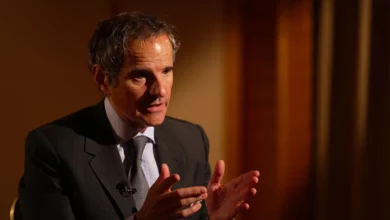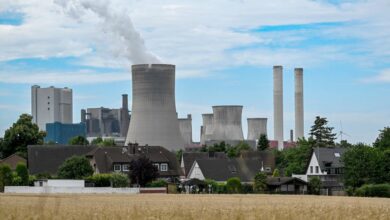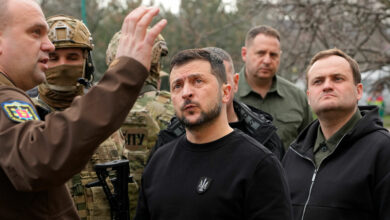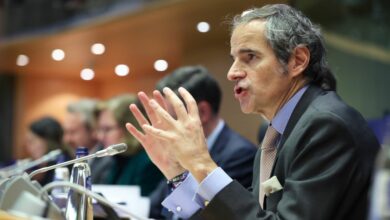Ibrahim el-Eseiry, former IAEA inspector, speaks to Al-Masry Al-Youm about the selection of el-Dabaa as the site for Egypt’s first nuclear power plant.
Al-Masry Al-Youm: To start with, can you give us a brief overview of nuclear plants around the world and to what extent they are used for the generation of electricity?
Ibrahim el-Eseiry: The latest study produced by the International Atomic Energy Agency (IAEA) in January reveals that there are around 436 active atomic energy stations, with 56 reactors under construction in 15 states. Another 26 countries are planning for an extra 143 reactors by 2030, with a capacity of 157,932 megawatts.
The whole world is interested in nuclear power as an eco-friendly energy that doesn’t produce harmful carbon emissions. The cost of electricity generated by nuclear power is cheap when compared to that produced by traditional stations.
Al-Masry: If that’s the case, why is the Egyptian nuclear scheme proceeding so slowly?
El-Eseiry: To be honest, Egypt is proceeding according to calculated steps that conform with international standards. Specifications about the project will be available at the end of this year. We are currently awaiting a license from the National Council for Nuclear Safety and Radiation Control (NCNSRC) to establish the plant in el-Dabaa. The license will serve as an approval for the choice of location. The license is expected to be issued next August.
Al-Masry: Some believe that Egypt cancelled its original nuclear plan in the wake of the Chernobyl disaster, and that tourist and hotel projects were undertaken in the area instead?
El-Eseiry: That’s a dishonest allegation, and the evidence is that in December of 1986–that was six months after the Chernobyl accident–the Egyptian Shura Council revised the nuclear program, forming a committee for that very purpose. Committee members included Farkhanda Hassan, as chairman, 20 parliamentarians, and intellectual figures, plus ministers and officials concerned with the project. The commission worked for six months, after which it recommended speeding up work on the project, which it conceived as an integrated program with national targets and scientific, developmental, political, and security significance.
Among recommendations was the establishment of a nuclear safety authority, which became a reality after 25 years, through founding the NCNSRC last March. We don’t need more delays; we have to join efforts to implement this project.
The Chernobyl disaster took place under different circumstances, but Egyptians are unfortunately the only nation still terrified of the reactor, whose design was different from other plants in the world. The Chernobyl reactor was established for military purposes, and it did not have a concrete shield to contain radiations. Add to this the fact that the accident occurred due to an error by its technicians.
Ukraine now has 15 nuclear stations for electricity generation, plus three reactors under construction. Nuclear power there produces 47 percent of the country’s electricity, and this has not affected tourism, as Ukraine comes eighth in the list of worldwide tourist attraction destinations.
Contrary to popular belief, nuclear power itself has become a tourist attraction. A new concept of “nuclear tourism” has evolved.
Two months ago, Czech Republic announced that its nuclear tourism has beaten usual tourism, as visitors are eager to tour reactors from inside and figure out how they operate.
In France, which receives 80 million visitors annually, there are 58 reactors sharing with 80 percent of the country’s electricity. Viewing the map of these reactors, one discovers that they are located in residential areas, and are situated on fresh water sources.
Al-Masry: Some suggest moving the project to another location, other than el-Dabaa…
El-Eseiry: Isn’t it better that tourism projects move to other spots to do their activities? That would be easier than moving a nuclear station. The campaign against the project is unjustified, and serves as a cover for mistakes or personal interests.
Al-Masry: Is el-Dabaa so sacred that no alternative can be provided?
El-Eseiry: We are not treating el-Dabaa as a “holy” location. Let’s talk numbers and calculate the size of the damage we will suffer if we do away with the location as a site. The choice of el-Dabaa was the outcome of studies conducted in the eighties, costing huge sums of money. It was picked from among 23 sites that underwent similar studies in the North Coast, North Sinai, the Bay of Suez, the Red Sea, the Delta, and Lake Nasser. It is now categorized as among the best sites in the world for nuclear purposes. This ranking was given by the IAEA , not Egypt.
El-Dabaa has what it takes for a successful undertaking. It enjoys an infrastructure of roads, sewage, radiation measures and seismic measures. The location for the plant’s refrigeration facilities have even been specified. When we renewed our studies of the site’s potential several months ago, the results supported the early findings.
Looking for a new location will require three years, in addition to two years for finishing the licensing procedures. That’s a total of five years of delay.
Economically speaking, to make studies on a site as suitable as el-Dabaa will cost US$1.7 billion, which can mount later to US$2 billion. That suggests that we can lose up to US$8 billion. Add to this the huge expenses for installing utilities, services, and new roads to the new sites. Within those five years, we would also keep squandering oil and gas for the sake of electricity generation, and have to pay US$5 billion for gasoline.
Another noteworthy point is the difficulty in foreseeing the conditions of manufacturing firms within those five years. Given the eagerness of world countries to establish nuclear reactors, such companies might be so busy that we are unable to contract with them. If we had built the nuclear stations 20 years ago, its cost would not have exceeded ten percent of its recent expense. I have to openly declare: even a one-year delay in carrying out the project will be a crime against the nation and future generations.
Al-Masry: Some businessmen fear that an accident might happen that could affect the whole are. Isn’t this fear realistic?
El-Eseiry: Does the occurrence of an accident during the use of a certain technology mean that we cease to rely on it? Aircraft crashes have not prompted the world to stop using aeroplanes. Mining accidents kill scores victims but are still operative.
It has been scientifically proven that the average radiation people are exposed to due to the activation of nuclear plants is ten times lower than what they are vulnerable to in ordinary environments, where the potential for accidents is nearly zero. But the question is, what to do when they take place.
Al-Masry: Ibrahim Kamel, a senior NDP member, is one of the investors operating near el-Dabaa. He believes the plant is merely an electricity generation station. Do you agree?
El-Eseiry: I completely disagree, for a number of reasons. To start with, we are in need of this technology for the future. If we fail to obtain it, we will fail to grasp any new technology that might surface. This project is a reason for national pride, and it will bring massive economic benefits. It will also secure indispensable resources like oil and natural gas for the next generations. The nuclear station contains civilian and technological facilities, besides valves, cables, pumps, tanks, pipes, and other things that serve the local industrial sector. This will help enlarge local contribution that will grow further with the expansion in new plants.
Al-Masry: There is a belief that the delay in adopting a political decision over el-Dabaa is the reason behind the problems facing the site currently. Do not you consider that a political decision choosing el-Dabaa will end the dispute?
El-Eseiry: I see no dispute; we are already working on a decision that was adopted in 1981, opting for el-Dabaa as a location for the plant for public benefit, and this decision is in force until now. Procedures for the project are being completed according to schedule with no obstacles. Not a single state official has demanded us to keep away from el-Dabaa.
Al-Masry: Is the Egyptian Atomic Energy Agency able to push that scheme forward?
El-Eseiry: Without wishing to sound harsh on ourselves, it’s enough that we have lost efficient personnel over the last 30 years. We are not in the operation stage yet, we are still in the process of preparing the manpower. Missions have been sent for training in Russia, the US, Germany, France, and Korea. During the five years required for establishing the station, we will train the personnel who will work on construction and activation.
Al-Masry: Do you feel easy with the US position on Egypt’s nuclear project?
El-Eseiry: I do not care for the Americans. What is important is that we are acting according to international regulations that guarantee transparency and confidence. Our nuclear plan is 100 percent peaceful, and is undertaken in collaboration with the IAEA, so why would the US stand against us?
In fact, Egypt signed three agreements during the eighties with France, the US, and Germany, according to which each of them will provide Egypt with two nuclear stations. We also engaged with the US in a nuclear collaboration deal that is still effective until now.
Al-Masry: What about the nuclear fuel cycle, would it not pose a problem for Egypt in the future?
El-Eseiry: Nuclear fuel is one of the requirements we take into consideration, and there is an action plan being drawn up to tackle the nuclear fuel cycle strategy. It is a blessing from God that uranium is one of the most plenteous ores on earth, but the decisive factor is the cost of extracting it. Future reactor technologies will not simply depend on uranium as a fuel, but will also rely on materials produced by “burning” uranium. The EAEA says it has a large reserve, and if Arab states integrate, they can become self-sufficient as far as uranium is concerned. The advantage in that case would be that uranium prices will be uniquely different from those of gas and oil, for even if they rise by 100 percent, electricity prices will see just a slight increase that will not affect consumers.
Al-Masry: Do you have an idea about the sources that can fund the project?
El-Eseiry: A scenario is being worked out to secure funding from different sources, such as state loans, local banks, and investment funds. There is a strategy for that purpose that we are still considering, which will be declared in time.
Al-Masry: What is the most fitting nuclear technology for Egypt, given that you have studied the CANDU reactors that operate with heavy water?
El-Eseiry: CANDU reactors are better since they do not require uranium or high enrichment technologies. The problem with heavy water is that its only exporter is Canada, and we have to take that in account. As for traditional reactors that operate with ordinary water, they demand complicated processes for enriching uranium, but can still be obtained from several sources.
Al-Masry: Does Iran intend to manufacture a nuclear bomb?
El-Eseiry: I worked for the IAEA from 1991 until 2009. During this period, i made inspection tours in many states, such as Japan, North and South Korea, Taiwan, China, Australia, Spain, Germany, Canada, the Netherlands, and Iraq. I never visited Iran, yet I believe that since it was a signatory of the NPT, it should seize this opportunity to seek peaceful nuclear capabilities. It is entitled to enrich uranium within the accepted limits stipulated by international treaty.
Translated from the Arabic Edition.




